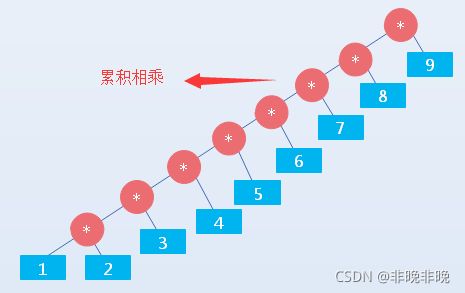【python基础】lambda函数以及和map、reduce、filter和sorted函数的联合使用介绍
文章目录
- 1. 介绍
- 2. 结合map函数使用
- 3. 结合reduce函数使用
- 4. 结合filter函数使用
- 5. 结合sorted函数使用
1. 介绍
lambda又称为匿名函数,lambda 并不会带来程序运行效率的提高,只会使代码更简洁。其定义形式如下:
lambda argument_list:expersion
- argument_list:参数列表
- expression:关于参数的表达式。表达式中出现的参数需要在argument_list中有定义,并且表达式只能是单行的。
用匿名函数有个好处,因为函数没有名字,不必担心函数名冲突。此外,匿名函数也是一个函数对象,也可以把匿名函数赋值给一个变量,再利用变量来调用该函数。
使用举例:
#这段代码
def calc(x,y):
return x**y
#换成匿名函数
calc = lambda x,y:x**y
print(calc(2,5))
def calc(x,y):
if x > y:
return x*y
else:
return x / y
#三元运算换成匿名函数
calc = lambda x,y:x * y if x > y else x / y
print(calc(2,5))
2. 结合map函数使用
map()函数接收两个参数,一个是函数,一个是序列,map将传入的函数依次作用到序列中每个元素,并把结果作为新的序列(需要用list方法转换)返回。
- 普通函数
lst = [1,2,3,4,5,6,7,8,9]
def fun(x):
return x * x
print(list(map(fun,lst)))
输出:
[1, 4, 9, 16, 25, 36, 49, 64, 81]
- lambda函数
lst = [1,2,3,4,5,6,7,8,9]
lst = map(lambda x:x*x,lst)
print(list(lst),type(lst))
输出:
[1, 4, 9, 16, 25, 36, 49, 64, 81] <class 'map'>
3. 结合reduce函数使用
reduce把一个函数作用在一个序列[x1, x2, x3, …]上,这个函数必须接收两个参数,reduce把结果继续和序列的下一个元素做累积相乘操作。


- 普通函数
from functools import reduce
li = [1,2,3,4,5,6,7,8,9]
def fun(x,y):
return x * y
print(reduce(fun,li))
输出:
362880
- lambda函数
from functools import reduce
li = [1,2,3,4,5,6,7,8,9]
print(reduce(lambda x,y:x * y,li))
输出:
362880
4. 结合filter函数使用
filter()也接收一个函数和一个序列 。会把序列中的每个元素作用于函数中,把其中每个满足true的元素保留下来,生成一个filter类型的对象,这个filter对象可以通过list方法转化为列表。
- 普通函数
lst = [2, 18, 9, 22, 17, 24, 8, 12, 27]
def fun(x):
if x%3==0:
return True
else:
return False
filter1 = filter(fun, lst)
lst1 = list(filter1)
print(lst1,type(filter1))
输出:
[18, 9, 24, 12, 27] <class 'filter'>
- lambda函数
lst = [2, 18, 9, 22, 17, 24, 8, 12, 27]
filter1 = filter(lambda x: x % 3 == 0, lst)
lst1 = list(filter1)
print(lst1,type(filter1))
输出:
[18, 9, 24, 12, 27] <class 'filter'>
5. 结合sorted函数使用
sorted如果key值,则默认将原序列进行升序排列。如果有key值,sorted的功能为将序列作用于函数,并将函数的返回值重新排列,如果有函数的话,key值不能省略。
- sorted的默认使用方法
lst = [1, 2, 30, 4, 5, 6, 7, 8, 9,4,80,5,4,2,86]
print(lst)
输出:
[1, 2, 30, 4, 5, 6, 7, 8, 9, 4, 80, 5, 4, 2, 86]
- 普通函数
def fun(x):
return abs(5 - x)
lst = sorted([1, 2, 3, 4, 5, 6, 7, 8, 9], key = fun)
print(lst)
输出:
[5, 4, 6, 3, 7, 2, 8, 1, 9]
- lambda函数
lst = sorted([1, 2, 3, 4, 5, 6, 7, 8, 9], key=lambda x: abs(5-x))
print(lst)
输出:
[5, 4, 6, 3, 7, 2, 8, 1, 9]
